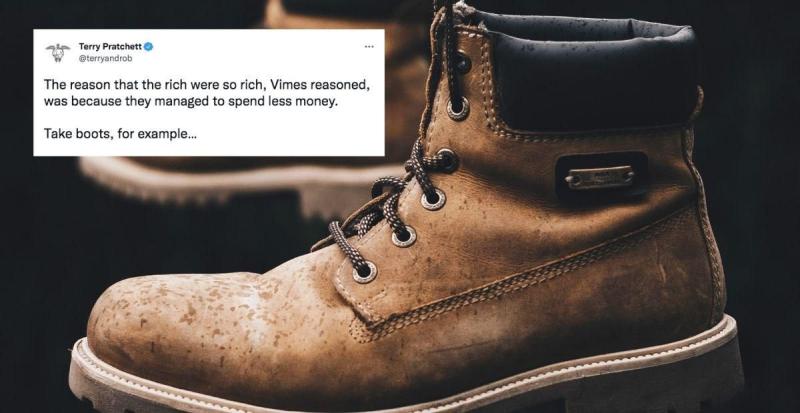A story about two pairs of boots illustrates how rich people get richer in ways poor people can't
By: Terry Pratchett (Upworthy)
Republicans have created a brand around "pull yourself up by your bootstraps" over the last few decades. Ronnie Raygun even ushered in the era where Republican neoliberal bootstrappers didn't have to build factories to make shoddy boots; they bought shoddier boots overseas and sold them at a bigger markup. Then the phony libertarians moved in to claim they had a God given right to cheat people with the shoddiest boots they could find.
We've heard the neoliberal Republican excuses. Efficiency. Productivity. Growth. Sustainable profits. Free markets meant free money. Neoliberal Republicans never had to work; their money worked for them. The neoliberal business model was built on lies, cheats, scams, swindles, flimflams. If a neoliberal couldn't cheat someone then it wasn't worth the effort. Just ask Newt Gingrich about the Norquist tax pledge. Neoliberal Republicans, under phony libertarian leadership, cheated entire generations of Americans. And they patted themselves on the back for doing it.
Meanwhile Democrats sitting back in their snobbish, self-conceited arrogance promise free money to the masses. The only thing Democrats have to do is take money away from those who didn't do anything to make money. Democrats became neoliberals when they gifted the economy to neoliberal moneymen. Democrats use the same excuses. Efficiency. Productivity. Growth. Sustainable profits. Free markets meant free money. Democrats claim a God given right to have someone else's money work for them by adding redistribution to their neoliberal business model. Slick Willie made it acceptable for Democrats to cheat the cheaters. Democrats employ a condescending populism to claim a Robin Hood authority to rob the robbers and give to the poor. But they always seem to set aside a big chunk of the spoils for themselves. Democrats tell us that, if not for their narcissistic intervention, people wouldn't even have shoddy boots. Democrats tell us that is an applause line.
Yes, neoliberal Republicans tried to take away the ladder. And neoliberal Democrats tried to pull up the ladder after they got theirs. Bipartisan neoliberalism has made the bottom rung of the ladder harder to reach for everyone.

Any time conversations about wealth and poverty come up, people inevitably start talking about boots.
The standard phrase that comes up is "pull yourself up by your bootstraps," which is usually shorthand for "work harder and don't ask for or expect help." (The fact that the phrase was originally used sarcastically because pulling oneself up by one's bootstraps is literally, physically impossible is rarely acknowledged, but c'est la vie.) The idea that people who build wealth do so because they individually work harder than poor people is baked into the American consciousness and wrapped up in the ideal of the American dream.
A different take on boots and building wealth, however, paints a more accurate picture of what it takes to get out of poverty.
Author Terry Pratchett is no longer with us, but his writing lives on and is occasionally shared on his official social media accounts. Recently, his Twitter page shared the "Sam Vimes 'Boots' Theory of Socioeconomic Unfairness" from Pratchett's 1993 book "Men At Arms." This boots theory explains that one reason the rich are able to get richer is because they are able to spend less money.
If that sounds confusing, read on:
\u2026 He earned thirty-eight dollars a month plus allowances. A really good pair of leather boots cost fifty dollars. But an affordable pair of boots, which were sort of okay for a season or two and then leaked like hell when the cardboard gave out, cost about ten dollars\u2026\n2/5 — Terry Pratchett (@Terry Pratchett) 1643144843
Pratchett wrote:
"The reason that the rich were so rich, Vimes reasoned, was because they managed to spend less money.
Take boots, for example. He earned thirty-eight dollars a month plus allowances. A really good pair of leather boots cost fifty dollars. But an affordable pair of boots, which were sort of OK for a season or two and then leaked like hell when the cardboard gave out, cost about ten dollars. Those were the kind of boots Vimes always bought, and wore until the soles were so thin that he could tell where he was in Ankh-Morpork on a foggy night by the feel of the cobbles.
But the thing was that good boots lasted for years and years. A man who could afford fifty dollars had a pair of boots that'd still be keeping his feet dry in ten years' time, while the poor man who could only afford cheap boots would have spent a hundred dollars on boots in the same time and would still have wet feet."
In other words, people who have the money to spend a little more upfront often end up spending less in the long run. A $50 pair of boots that last five years essentially cost you $10 a year. But if you can only afford $10 upfront for a pair of boots that last six months, that's what you buy—and you end up paying twice as much over a five-year period.
There are so many areas in which this principle applies when you're poor. Buying in bulk saves you money over the long run, but you have to be able to afford the bulk cost up front. A reliable car that doesn't require regular repairs will cost more than a beater, but if the beater is all you can afford, that's what you're stuck with. You'll likely spend the same or more over time than if you'd bought a newer/higher quality car, but without the capital (or the credit rating) to begin with, you don't have much choice.
People who can afford larger down payments pay lower interest rates, saving them money both immediately and in the long run. People who can afford to buy more can spend more with credit cards, pay off the balances, build up good credit and qualify for lower interest rate loans.
There are lots of good financial decisions and strategies one can utilize if one has the ability to build up some cash. But if you are living paycheck to paycheck, you can't.
Climbing the financial ladder requires getting to the bottom rung first. Those who started off anywhere on the ladder can make all kinds of pronouncements about how to climb it—good, sound advice that really does work if you're already on the ladder. But for people living in poverty, the bottom rung is just out of reach, and the walls you have to climb to get to it are slippery. It's expensive to be poor.
When people talk about how hard it is to climb out of poverty, this is a big part of what they mean. Ladder-climbing advice is useless if you can't actually get to the ladder. And yet, far too many people decry offering people assistance that might help them reach the ladder so they can start taking advantage of all that great financial advice. Why? Perhaps because they were born somewhere on the ladder—even if it was the bottom rung—and aren't aware that there are people for whom the ladder is out of reach. Or perhaps they're unaware of how expensive it is to be poor and how the costs of poverty keep people stuck in the pit. Hopefully, this theory will help more people understand and sympathize with the reality of being poor.
Money makes money, but having money also saves you money. The more money you have, the more wealth you're able to build not only because you have extra money to save, but also because you buy higher quality things that last, therefore spending less in the long run. (There's also the reality that the uber-wealthy will pay $5,000 for shoes they'll only wear a few times, but that's a whole other kind of boots story.)
Thanks, Terry Pratchett, for the simple explanation.





Under Bidenomics those $10 shoddy boots now cost $50. And Democrats will try to convince us the boots are somehow better. Biden will tell us that the rich should be robbed by Democrats so everyone can have those higher priced shoddy boots. Biden ain't building factories to make boots, either. So, we shouldn't expect better boots or cheaper boots.
Democrats' shoddy boots ain't any different than Republicans' shoddy boots. Remember that when you vote fourteen months from now.
Any idea just where the polling booth in Ankh-Morpork is? I understand dead Canadians can vote as often as they wish at them.
It's two tenets to the right. You may not be able to get there.
I do prefer the center, radicalism is just a shifting of rulers.
Ah, mobius logic. The center is never static.
Whatever that is ...
It's logic that never arrives at a conclusion.
Also remember these:
We’re no longer spilling blood and wasting massive amounts of treasure in Afghanistan.
We have the lowest unemployment in 50 years.
The Dow is 20% higher than 2019.
Average hourly rate now $28.34, 2019 was $19.33. A 46% increase.
Inflation now 3.2%, 2019 was 1.8%. Pretty reasonable after having the gov't pump $8T into the market and economy.
We have a $1.7T Infrastructure bill.
We have the Inflation Reduction Act’s Climate Mitigation Tax credits which they hoped would spur $370B private investment in renewables over 10 years. In the year since its passage, investment was $270B, which is more than the previous 8 years combined.
We have the CHIPS act investing in IC manufacturing.
First gun violence reduction legislation in 30 years.
Uninsured in 2019 was 9.2%, it’s 8% now. About 4 million more with insurance now.